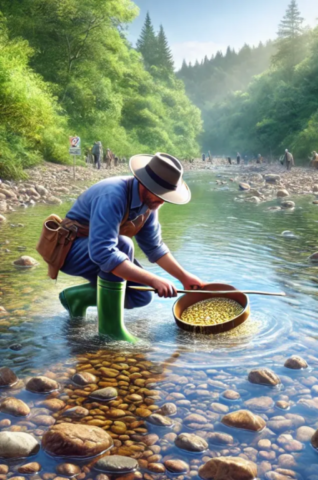Prospecting alluvium : the legislation
In France, prospecting for alluvial deposits in streams and rivers, particularly for gold, sapphires, and zircons, is a strictly regulated activity. Governed by the Mining Code and the Environmental Code, it aims to preserve natural resources and limit the impact on aquatic ecosystems. Any mineral exploration activity in waterways is subject to strict permits and restrictions.
Legislative framework and authorizations :
The Mining Code :
The Mining Code defines the regime governing the prospecting and exploitation of mineral substances in France. According to Article L111-1, deposits of mineral or fossil substances contained in the subsoil are distinct from land ownership and belong to the State. This provision implies that prospecting cannot be carried out freely and must be regulated by appropriate authorizations.
Article L121-1 specifies that mining operations are subject to obtaining a mining title issued by the administrative authority. Any prospecting activity must therefore be subject to a prior application, and recreational gold panning is tolerated provided it complies with the operating conditions set out in Article L611-1, which requires that no harm be caused to the environment.
The Environmental Code :
The Environmental Code imposes restrictions for the preservation of aquatic environments. Article L211-1 reiterates that water resource management must ensure the protection of aquatic ecosystems.
Under Articles L214-1 to L214-6, any modification to watercourses likely to affect natural habitats is subject to authorization. Article R214-1 specifies that mineral prospecting in rivers may require specific environmental authorization, depending on the areas concerned. Furthermore, installations, structures, and activities affecting the water regime are governed by these regulations, which require the rational management of extractive practices.
Authorization procedure and geographical restrictions :
Before undertaking any prospecting activity, it is essential to obtain prefectural authorization. The application must include :
- The precise location of the prospected area
- The nature of the equipment used
- The planned period of activity
Some prefectures prohibit prospecting in so-called sensitive areas, such as :
- Nature reserves
- National parks
- Natura 2000 sites
It is therefore essential to check with local authorities before taking any action. Prefectural decrees may also specify the conditions for prospecting in certain rivers, particularly due to the sensitivity of aquatic environments or tourist pressure.
Authorized equipment :
Regulations restrict the use of equipment in order to preserve ecosystems. Only hand tools are permitted :
- Battery
- Screen
- Shovel
- Washing ramp under certain conditions
The use of motor pumps, dredges, or other mechanical devices is strictly prohibited, as these devices can cause significant damage to the natural environment and disrupt riverbeds. Furthermore, the movement of sediment can disturb aquatic life and destabilize riverbanks.
Prospectors' obligations :
Prospectors must respect the environment and restore the sites explored. They must :
- Not permanently alter the riverbed
- Avoid disturbing aquatic flora and fauna
- Not dig deep holes that could alter the natural flow of the water
- Prohibit the use of chemicals (mercury, cyanide) to extract minerals
Extraction must be carried out in a sustainable manner and respect ecological balances, avoiding the reproduction periods of aquatic species and refraining from altering the morphology of the watercourse.
Penalties for non-compliance :
Failure to comply with these obligations exposes offenders to penalties. In accordance with Article L173-1 of the French Environmental Code, they risk :
- A fine of up to €18,000
- Seizure of the equipment used
- A temporary or permanent ban on prospecting
In the event of serious environmental damage, criminal penalties may be imposed, including prison sentences in the event of a repeat offense or large-scale illegal exploitation.
Inspections and monitoring :
The relevant authorities, including the French Office for Biodiversity (OFB) and the environmental police, conduct regular inspections to ensure compliance with regulations. Patrols are conducted at sensitive sites, and reports may be made by local residents or other waterway users.
Alluvial prospecting in French waterways, although practiced by many amateurs, remains an activity governed by a set of laws aimed at preserving the environment and natural resources. It is essential for any prospector to first inform themselves about the regulations in force and to adopt respectful practices in order to carry out this activity legally and in harmony with nature.

